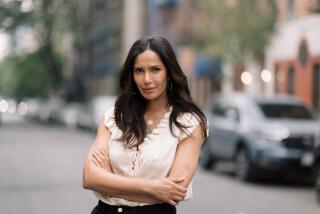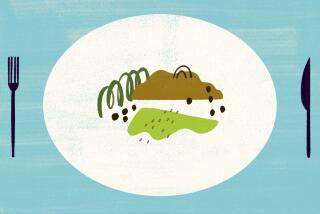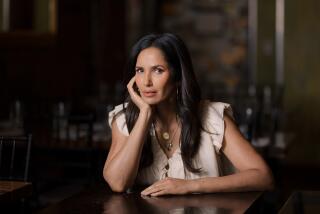‘Drunk, Disorderly, Quite a Good Cook’
- Share via
Jennifer Paterson, who died last week at 71, will be best remembered as part of a duo, one of the “Two Fat Ladies” in the BBC TV cookery series. Yet for most of her life, she worked solo--in no uncertain terms.
She was singular right down to the language that she employed. Long before the cameras and microphones arrived, she had decided to prefer the antique term “receipt” to “recipe.” She used it with throaty grandeur, rolling her Rs and striking her Ts in a voice deepened over the years by gin, unfiltered Woodbine cigarettes and a thunderous laugh.
Viewers of the TV show will know her rather oddly kitted out in World War I-era aviator gear, riding a vintage Triumph fixed with a German sidecar for her co-star. In real life, Paterson sported electric pink smocks and stretchy leggings and rode around central London on a 90-cubic centimeter Honda scooter, fixed with what seemed like a permanent learner’s plate. There was no Red Baron leather helmet, just a cheap plexiglass one pasted over with sparkly stickers.
Reading her obituaries, I was amused at the confusion over her career pre-television. It brought back a teeth-pulling exercise in 1993 when I profiled her for a London newspaper. She simply could not see the point of lots of boring facts, much less ones lined up in chronological order. She regaled me instead with enough exotic anecdotes to rival Marco Polo.
Quite how or when she ended up cooking at a provincial English school remains unclear, but there she bought her scooter. “I was working at a very peculiar school in Padworth. One of the masters arrived with one of those men’s complaints before AIDS--VD--and he left his motorbike behind. I started riding it and I bought it.”
By the 1970s, she was back in London and working as an in-house cook for Spectator magazine, the British equivalent of the National Review. Here she served Prince Charles ceviche--or, as she described it to him: “Raw fish, Your Majesty.” It only occurred to her later that it should have been “Raw fish, Your Royal Highness.”
Alexander Chancellor, former editor of the Spectator, remembers her as “drunk, disorderly, quite a good cook really. I fired her once. I can’t remember for what. She had this fantastic trick of not leaving. She just stayed.”
After Chancellor left the Spectator, his successor gave her a cookery column and her eccentricity poured into print. Poaching eggs successfully, she told readers, required two Our Fathers and one Hail Mary. As a solution to persistent confusion between Belgian endive and chicory, she decreed that the British should refer to endive by the Dutch name, “witloof.”
“Witloof” didn’t catch on, but she did. Derek Jarman insisted on her presence in a banquet scene in his film “Caravaggio.” BBC Radio 4 put her on quiz shows. Her Spectator column became a cult book, “Feast Days.” By the mid-’90s, she was partnered with the erudite book-seller Clarissa Dickson Wright for “Two Fat Ladies.”
Paterson enjoyed teasing young men, whom she enchanted. Spotting fashion designer Bruce Oldfield wearing a Nehru collar at a party, she greeted him as “vicar” and got him to fetch her a pink gin. At the time she died, she was living with an elderly uncle in a delightful jumble of an attic flat in Westminster.
“I don’t think that I ever required to get married,” she said in response to one of my nosy inquiries in 1993. “I think I was a bit of an old pirate.”
More to Read
The complete guide to home viewing
Get Screen Gab for everything about the TV shows and streaming movies everyone’s talking about.
You may occasionally receive promotional content from the Los Angeles Times.






